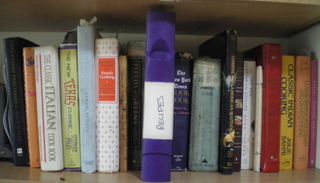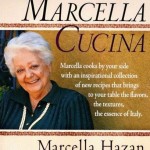 Some of the most charmingly biased writing can be found in the prose of great cooks. Here is Marcella Hazan’s aria on vegetables:
Some of the most charmingly biased writing can be found in the prose of great cooks. Here is Marcella Hazan’s aria on vegetables:
 “Perhaps one day the vitality of these still-flourishing markets will be replaced by the pallor of deep-freeze counters, those cemeteries of food, where produce is sealed up in waxed boxes marked, like some tombstones, with photographs of the departed. But I hope it never happens. I would sooner be deprived of all the marvels of Michelangelo.
“Perhaps one day the vitality of these still-flourishing markets will be replaced by the pallor of deep-freeze counters, those cemeteries of food, where produce is sealed up in waxed boxes marked, like some tombstones, with photographs of the departed. But I hope it never happens. I would sooner be deprived of all the marvels of Michelangelo.
“The quality of Italy’s produce is matchless. Only that of France comes close…Do not waste your efforts on second-rate materials. Buy carefully, avoiding any vegetable that is wilted, badly bruised, ill assorted, tired-looking, soggy, flabby, or overgrown. Shopping for good fresh vegetables in this country may be frustrating at times, bit that does not mean we must deliver ourselves up in thralldom to the frozen-food shelves.”
Or the final paragraph of her page-long disquisition (worth reading!) on Parmesan cheese: “The recipes in this book call for freshly grated Parmesan cheese. Do not under any circumstances use ready-grated cheese sold in jars. Even if this commercially grated cheese were of good quality, which it is not, it would have lost all its flavor long before getting to the market. It is of no interest whatever to Italian cooking.”
 Here’s Julia Child on wine: “Food, like the people who eat it, can be stimulated by wine or spirits. And, as with people, it can also be spoiled…If you have not a good wine to use, it is far better to omit it, for a poor one can spoil a simple dish and utterly debase a noble one.”
Here’s Julia Child on wine: “Food, like the people who eat it, can be stimulated by wine or spirits. And, as with people, it can also be spoiled…If you have not a good wine to use, it is far better to omit it, for a poor one can spoil a simple dish and utterly debase a noble one.”
 And here’s Elizabeth David on the same subject: “Nobody has ever been able to find out why the English regard a glass of wine added to a soup or stew as a reckless foreign extravagance and at the same time spend pounds on bottled sauces, gravy powders, soup cubes, ketchups and artificial flavorings. (She adds a long footnote on the poisonous nature of these flavorings, which employ putrid cheese, gas tar and nitric acid.) If every kitchen contained a bottle each of red wine, white wine and inexpensive port for cooking, hundreds of store cupboards could be swept clean for ever of the cluttering debris of commercial sauce bottles and all synthetic aids to flavoring…Sherry is a good addition, but should be used in cooking with the utmost discretion; it is useless to think that the addition of a large glass of poor sherry to the contents of a tin of soup is going to disguise it.”
And here’s Elizabeth David on the same subject: “Nobody has ever been able to find out why the English regard a glass of wine added to a soup or stew as a reckless foreign extravagance and at the same time spend pounds on bottled sauces, gravy powders, soup cubes, ketchups and artificial flavorings. (She adds a long footnote on the poisonous nature of these flavorings, which employ putrid cheese, gas tar and nitric acid.) If every kitchen contained a bottle each of red wine, white wine and inexpensive port for cooking, hundreds of store cupboards could be swept clean for ever of the cluttering debris of commercial sauce bottles and all synthetic aids to flavoring…Sherry is a good addition, but should be used in cooking with the utmost discretion; it is useless to think that the addition of a large glass of poor sherry to the contents of a tin of soup is going to disguise it.”
And I love David’s short paragraph at the end of her “Batterie de Cuisine” section, after she has spent five or six pages detailing essential kitchen tools: “Some sensible person once remarked that you spend the whole of your life either in your bed or your shoes. Having done the best you can by shoes and bed, devote all the time and resources at your disposal to the building up of a fine kitchen. It will be, as it should be, the most comforting and comfortable room in the house.”
If I were ever to teach writing again, I’d include excerpts from these writers along with my favorite essays of George Orwell and Adam Gopnik and some of William Logan’s biting, accurate, and fearless evisceration of contemporary poets (analysis and praise, too, when warranted). The command of grammar (Marcella Hazan, not even a native speaker, makes excellent use of the subjunctive, and Elizabeth David uses the slippery semi-colon perfectly), the passion and the richness of their prose make reading their books not only instructive but pure pleasure for those who love words as much as food.
In case you might want to create the syllabus for such a ravishing course, the selections above are from The Classic Italian Cookbook, Marcella Hazan; Mastering the Art of French Cooking, Volume One, Julia Child, Louisette Bertholle, Simone Beck; and French Country Cooking, Elizabeth David. From Orwell’s essays I’d include “How the Poor Die,” “Some Thoughts on the Common Toad,” “Revenge is Sour,” “Reflections on Ghandi,” and “Such, Such Were the Joys,” in addition the much anthologized (but perhaps slightly too didactic “Politics and the English Language.” Some of these are hard to find, but available in the four volume set of letters and essays, which is worth owning. My favorite Gopnik essays include “Last of the Metrozoids,” “The Rules of the Sport,” “Barney in Paris,” and “Bumping Into Mr. Ravioli.” These are available in Paris to the Moon and Through the Children’s Gate: A Home in New York. You can often find William Logan’s criticism online in “The New Criterion,” as well as his books: Our Savage Art: Poetry and the Civil Tongue and The Undiscovered Country: Poetry in the Age of Tin.
 I just came across a reaction by Zoë Heller to the proposition posited by Lee Siegel for The New Yorker and Isaac Fitzgerald at BuzzFeed that reviewers should only publish positive book reviews. Siegel and Fitzgerald feel we shouldn’t say anything negative about the poor authors who have worked so hard. Heller makes the case that banning “negativity” is bad for the culture and unfair to authors. I couldn’t agree more. In fact I more than agree. Continue reading “More on Diana Moon Glampers, a short rant”
I just came across a reaction by Zoë Heller to the proposition posited by Lee Siegel for The New Yorker and Isaac Fitzgerald at BuzzFeed that reviewers should only publish positive book reviews. Siegel and Fitzgerald feel we shouldn’t say anything negative about the poor authors who have worked so hard. Heller makes the case that banning “negativity” is bad for the culture and unfair to authors. I couldn’t agree more. In fact I more than agree. Continue reading “More on Diana Moon Glampers, a short rant” 






